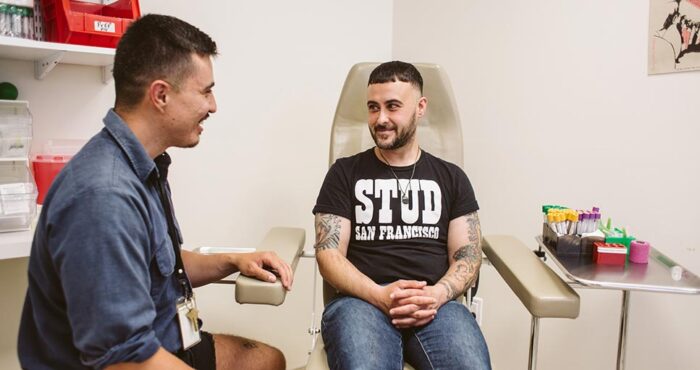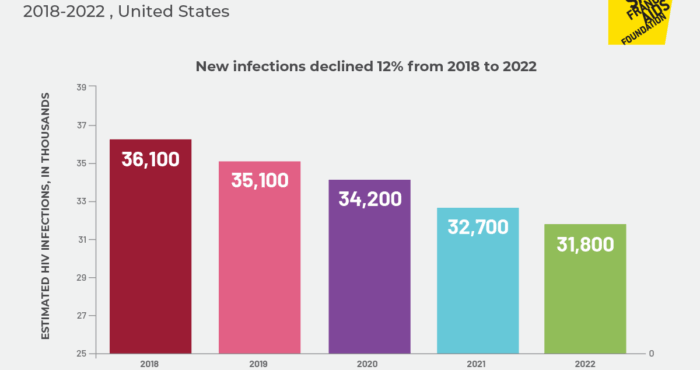In an event for our HIV-positive community, Dr. Neal Sheran, the Special Populations Clinical Chief at the HIV clinic at Mission Neighborhood Health Center, invited Priscilla Hsue, MD, FACC, a cardiologist at Zuckerberg San Francisco General Hospital, to talk about heart health and inflammation, and why cardiovascular conditions are becoming a growing concern for people growing older with HIV.
What’s the risk of cardiovascular disease?
Hsue began the event by reviewing the research around myocardial infarction (heart attacks), sudden cardiac death, cardiovascular disease associated mortality, and other cardiovascular issues. The bottom line, she shared, is that there seems to be an increased risk for cardiovascular disease among people living with HIV—even when HIV is treated successfully and viral loads are suppressed.
She cited a study of thousands of people receiving care through the Veterans Association, which found that people living with HIV had a 50% increased risk for myocardial infarction (a heart attack, or an acute blockage in a heart vessel) than people who were HIV-negative. This risk remained, said Hsue, even when people living with HIV were on treatment for HIV and had their viral loads suppressed.
Another study showed that people living with HIV have an increased risk for mortality (death) caused by cardiovascular disease compared to people who are HIV-negative. And, that this risk has been increasing during the time period studied (1999 to 2013), even though the risk has been decreasing among people who are HIV-negative. Studies have also found higher risk of developing heart arrhythmias, heart failure among people who also have depression, and pulmonary hypertension among people living with HIV.
Sudden cardiac death—when a person dies suddenly from a heart problem—is also a significant issue. A study conducted from 2001 to 2009 at Zuckerberg San Francisco General Hospital found that sudden cardiac death among people living with HIV was more than 4.5 times higher than among people in a similarly-matched HIV-negative population. To follow-up on this issue, said Hsue, one of her colleagues is currently conducting an autopsy study on people living with HIV who die from cardiac issues to try to identify the cause of death. The goal, she said, is to eventually be able to identify people who are at high risk—so that physicians can intervene sooner before people experience serious heart problems.
Can we identify people at risk?
Hsue said that it is difficult for physicians to anticipate when people living with HIV might be vulnerable to cardiac problems. “We are not great at predicting people who are going to have a heart attack,” she said.
Physicians use “risk calculators”—and plug in factors like gender, cholesterol, and smoking history—to estimate cardiac risk among people in the general population. But these calculators “dramatically” underestimate the risk for people living with HIV. One study, said Hsue, found that risk calculators underestimated the risk of having a heart attack by almost 50%.
The other issue is that researchers and clinicians don’t know what the risk of cardiovascular problems are for people who started taking HIV medications soon after their HIV diagnosis. (Only relatively recently have HIV treatment guidelines specified that everyone living with HIV—at any stage of infection—should be on antiretrovirals.)
Do HIV medications cause heart problems?
Hsue quickly summarized what clinicians know about the effect of antiretrovirals on heart health. Some long-term studies have found that long-term exposure to protease inhibitors can increase the risk of heart attack. Some studies (but not all) have found that abacavir increases risk. The risk from newer drugs like integrase inhibitors isn’t known yet.
“We still don’t know what the best cardio-protective regimen is. It’s still not known,” said Hsue.
Starting HIV medications right away is important, Hsue stressed. There is strong evidence that starting HIV medications early, and staying on them continuously is better for heart health. The reason, she explained, is likely linked to the effect of antiretrovirals on inflammation.
More about inflammation—and how it hurts the heart
Chronic inflammation is a symptom of HIV infection, that persists even when a person is on treatment with a suppressed viral load. And inflammation predicts cardiovascular problems in people living with HIV, although Hsue shared that the underlying cause is still not known.
“Many things come together to produce inflammation,” said Hsue. “Even if viral loads are suppressed, HIV is not cured. HIV persists in the body, and still causes inflammation.”
Researchers can measure inflammation by looking at different “markers” of inflammation—or proteins that can be measured in the blood that reflect ongoing levels of inflammation in the body. (Some examples of inflammatory markers are C-reactive protein and interleukin-1β.) In addition to things like smoking cigarettes, high blood pressure and high cholesterol, these inflammatory markers are strongly predictive of cardiovascular disease in people in the general population.
People at high risk for cardiovascular disease “should be on a statin,” said Hsue. “But statins may not be the answer to targeting inflammation. How best do we reduce risk in a patient who’s already on a statin? That’s what my group is studying,” she said.
Treatments to reduce cholesterol and inflammation
Hsue shared research on new therapies that may help people living with HIV reduce cholesterol and inflammation. New cholesterol-lowering medications, that are injected once per month, are now being studied. One agent, she shared, lowered cholesterol by 60% even among people who were already taking a statin.
A different antibody-based therapy, called canakinumab, is being studied by Hsue’s research team as a therapy to reduce inflammation. The results of a very small study with people living with HIV, presented at CROI 2017 by Hsue, found that this therapy had a dramatic effect on inflammatory markers. In the study, a single dose of canakinumab, delivered as an injection under the skin, reduced makers of inflammation including IL-6 and high-sensitivity C-reactive protein. The treatment also reduced inflammation in arteries and bone marrow.
“There was a significant reduction in inflammatory markers. The most significant [reduction] shown to date,” said Hsue.
Are cardiovascular problems inevitable?
“I think inevitable is a stronger word than I would choose,” said Hsue, responding to audience members who expressed concern at the research shared at the event. “Nothing is inevitable. I think the issue now is you’re going to do well with HIV. But it’s more these chronic health conditions, the chronic inflammation, the non-AIDS conditions, like renal disease, lung disease and heart disease which are becoming more and more important.”
It’s important, she stressed, for people to change the things that are under their control—like quitting smoking. “Studies show that people living with HIV lose more years to smoking than HIV disease itself. This is a reminder, to me as a heart doctor, about the importance of counseling all of my patients to stop smoking. But, it’s incredibly hard for people to do.”
There’s “still a lot we don’t know” about cardiovascular risk and inflammation for people living with HIV, said Hsue, underscoring the importance of research that is parsing exactly where risk is coming from, and what we can do to reduce risk.
Want to continue reading about inflammation on BETA?
New research shows abnormal immune activation even in very early HIV infection. “Many markers of immune activation fail to normalize even when ART is initiated during the earliest stages of acute HIV infection,” said Peter Hunt, MD.
Weight gain exacerbates inflammation in people living with HIV. Weight gain or mid-section obesity—even for people successfully treating HIV with antiretrovirals and with controlled viral loads—appears to not only heighten inflammation but is also linked to neurocognitive impairment.
The low-down on inflammation from an HIV doctor, by Joanna Eveland, MD. “Inflammation is linked to just about every bad thing that can happen to our body—cancer, heart disease, liver and kidney failure, dementia and autoimmune disease (just to name a few). A few years ago, HIV specialists and researchers started talking about inflammation more and more. We noticed that people living with HIV—even those successfully treated with combination antiretroviral therapy (ART)—had higher levels of inflammation than HIV-negative people.”










